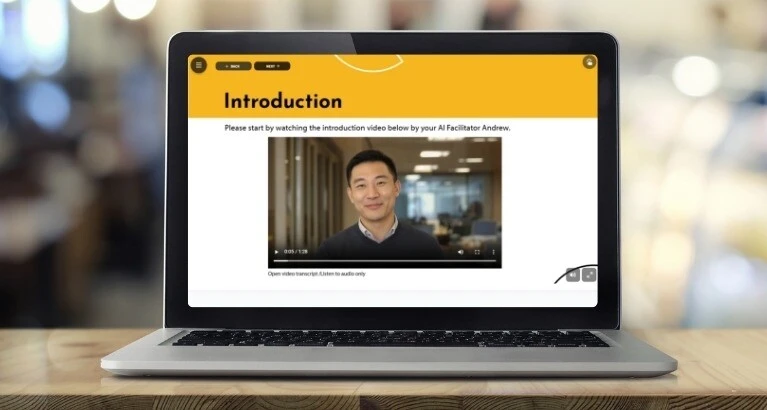For us as business leadership educators, the challenge is 2-fold: how do we not only use the powers of AI in our education and teaching, but also how do we train future leaders to think critically about the transformative technology we will all come to rely on?
At Cambridge Judge, AI is being explored across multiple dimensions:
- teaching innovations including AI simulations and embedded tools to enable hands-on, interactive learning
- research which applies AI to practical matters such as branding, mentoring and decision-making
- student-led experimentation with new tools, platforms and formats
Cambridge Judge is engaging with AI not as a standalone topic, but as a technology that is woven into the fabric of our thinking about leadership, research and education.
AI demand from students drives enthusiasm across the Business School
As an era-defining innovation, AI is obviously sparking demand from our students for these initiatives. Floris Eland, a Cambridge MBA student from the Netherlands (MBA 2024), had deep experience in AI in his career as a consultant for large Dutch companies, and is now co-chair of the AI Student Interest Group at Cambridge Judge.
“I learned from my time as a consultant that AI is a tool, not an end in itself,” says Floris. “Organisations using AI need to ask ‘what is the goal, and what is the benefit it will have?’ It makes no sense to chase AI only because it is hot.
“In my studies at Cambridge Judge I’m thinking about how companies can position themselves with the right data to use AI in a way that gives them a competitive advantage,” says Floris.
This enthusiasm is met with equal commitment from our faculty and leadership.
“Cambridge Judge is engaging with AI not as a standalone topic, but as a technology that is woven into the fabric of our thinking about leadership, research and education,” says Professor Gishan Dissanaike, Dean of the Business School.
I learned from my time as a consultant that AI is a tool, not an end in itself. Organisations using AI need to ask ‘what is the goal, and what is the benefit it will have?’ It makes no sense to chase AI only because it is hot.
How are Cambridge Judge faculty bringing AI to life in the classroom?
In our classrooms, AI is not just a case study or discussion topic, it’s an opportunity for collaborative, team learning. Our academics are using it to engage students through interactive case studies, competitions and customised tools.
Students in Chris Coleridge’s MBA core class on Strategy take part in a tournament in which teams represent leading AI-involved companies including OpenAI, Anthropic, Google/Gemini, x.ai, Mistral and Meta.
They are tasked with developing a strategy for their firm, which was recently presented to a panel of expert professionals who visited to offer real-world insights.
“It’s an engaging competition that’s proved to be a lot of fun for students,” says Chris, Management Practice Associate Professor. “The idea is to help students apply their Strategy learning to thinking about how major firms, like the key players in AI, can develop competitive advantage. Some of the firms around at the birth of microcomputing are now the most powerful the world has ever seen, so will the new Gen AI-focused businesses be able to disrupt these giants and develop their own business empires?”
Cambridge Judge students in some Master of Finance (MFin) and Executive Master of Accounting classes have the opportunity to use bespoke AI tools designed using ChatGPT by their lecturer, Professor of Economics Paul Kattuman.
The Executive Master of Accounting’s Statistics ‘AI tutor’ is a learning assistant focused on data analysis issues in finance and accounting. The tutor supports students in mastering and applying concepts and methods to address analytical challenges they face in real-world scenarios. For instance: does implementing new invoicing software increase efficiency by reducing processing times across departments? The AI tutor helps students to formulate this as a testable hypothesis and guides them through concepts such as sampling distributions, confidence intervals and P-values, which all relate to probability.
Step-by-step guidance on interpreting results enables data-driven decisions on their organisations’ operational practices. Another practical example looks at what determines audit fees charged? Here, the AI tutor guides students through exploring data, constructing regression models, evaluating model reliability, performing hypothesis tests on relationships, and creating visualisations to clearly communicate findings – all with interactive use of statistical software. Whether it’s pricing strategies, profitability analyses or identifying operational inefficiencies, the AI tutor equips students with knowledge and confidence.
“These bespoke tools illustrate in a very clear way how AI can be used to illustrate rewarding but challenging data analysis concepts that can be applied to disciplines such as finance and accounting,” says Paul. “They have proved popular with students, and I have enjoyed using them in teaching.”
The idea is to help students apply their Strategy learning to thinking about how major firms, like the key players in AI, can develop competitive advantage. Some of the firms around at the birth of microcomputing are now the most powerful the world has ever seen, so will the new Gen AI-focused businesses be able to disrupt these giants and develop their own business empires?
How has AI improved case study learning?
Our students and faculty are also innovating in partnership on new AI-based tools. An AI-enabled case study with character interaction has been developed by Dr Anyu Gao, a fellow and Executive MBA graduate (EMBA 2022) of Cambridge Judge, and Stelios Kavadias, Margaret Thatcher Professor of Enterprise Studies in Innovation and Growth, and is being used as material in various courses.
“What we’re doing is personifying executives and senior managers from the case on paper into highly interactive characters. These characters were brought to life by AI that students can interact with, making the experience far more immersive,” says Anyu. “This isn’t just a tech upgrade – it’s about how students engage with material to enhance their learning outcomes, and how we re-think and scale teaching for traditional classes, as well as remote or individual learners.”
The case study focuses on a crucial issue facing companies and other types of organisations: which innovation projects to invest in that truly align with their strategic objectives, and which to not pursue. It’s a very complex problem in which organisations need to step back and consider multiple parameters.
“Delivering this in a dry, lecture-based way has limited effect,” says Stelios, adding that “even a standard case where you’re just given a snapshot of what happened in a company doesn’t feel sufficient. You need to live through the context: what it’s like to have different individuals with different perspectives coming together as a leadership team, trying to make a decision.”
Key to the AI case study’s success, he says, is an immersive and interactive environment in which students ask questions of chatbox characters who personify key executives in the case, which brings an exciting new level of interaction and engagement.
Stelios says the case study has shown that the teacher-student relationship is changing in this AI era. The teaching capacity “used to reside solely with the educator – the professor, the lecturer, the person on stage”, but the role of the educator as a content deliverer is now becoming “just one part of a more cross-functional, collaborative educational experience – a shift from the more traditional, single-speaker model of the past.”
You need to live through the context: what it’s like to have different individuals with different perspectives coming together as a leadership team, trying to make a decision.
What are Cambridge Judge PhD students discovering with AI?
Cambridge Judge faculty research on AI and LLMs has ranged from papers on decision-making to creativity to corporate strategy in the automobile sector, which were explored in a previous article in this series. The next generation of academics, our PhD students, are also powering into this topic, applying cutting-edge techniques and showing new possibilities for how AI can be applied in business and society.
Applying AI to football – and beyond
Football and AI may not be the most obvious partnership, but research by PhD candidate Liang Zhao is using AI to put English Premier League mega-brand managers in the spotlight. The usual methods to evaluate managers, including win percentages, do not separate managerial ability from the team’s resources and other circumstances. So the research, done with Ahmed Khwaja, Professor of Marketing, Business and Public Enterprise, and applied to football clubs such as Liverpool and Manchester United, uses LLMs to quantify managerial ability with unstructured but publicly available data such as interviews and news articles, thus providing “direct and unbiased quantification of managerial abilities”. While the ongoing study focuses on football management, “the approach has potential in other fields such as talent evaluation, co-branding partnerships and corporate leadership,” say Liang and Ahmed.
Using AI to personalise recipes
Fellow PhD student at Cambridge Judge, Sonal Srivastava, is partnering with one of the leading meal-kit providers in the UK in applying reinforcement learning techniques to better personalise recipes for consumers. They are analysing household-level data to explore how people choose recipes, a hybrid approach which is a “step towards algorithms that are not just scalable, but also usable by decision-makers who need to trust what the models are doing,” says Sonal.
Advancing mentorship with AI
And to complete the set, Soniya Gupta-Rawal, Ahmed Khwaja and Jaideep Prabhu, Professor of Marketing, are trying to better match workplace mentors and mentees, using AI tools along with other methodologies such as interviews. The research, in collaboration with the Accelerate Cambridge incubator programme at the Business School’s Entrepreneurship Centre, uses AI-powered sentiment analysis on videos submitted by venture founders in their application and later Pitch and Judge events.
Their work gives insights into the “emotional and professional growth of entrepreneurs”, say the authors, “aiming to enhance the mentorship framework by identifying key success metrics, improving mentor-mentee pairings, and contributing to the development of evidence-based policies for supporting entrepreneurs.”
The innovative, broad and potentially impactful research of our early-career academics is an important aspect of the Business School’s commitment to contribute to AI scholarship and its real-world application – now and into the future.
How is AI impacting knowledge creation?
The elephant in the room in this discussion is: if knowledge creators are integrating AI technology into their research and output, is it producing good quality work? With high quality input, it can be very good, despite the lingering issue of ‘hallucinations’ (relevant but false information) – and that poses a quandary.
Because LLMs are so powerful, they can be manipulated to create articles or findings known as deep research fakes designed to trick or deceive researchers. Academic fraud is nothing new, but today’s scholars need to be doubly on guard to spot such deliberate deception.
Yet beyond such troublemaking, academia in the AI age faces a more existential issue: are highly trained scholars really special anymore? In the era before machine learning, elite scholarship was considered very scarce and time consuming, but if AI can rapidly produce journal-quality papers, such scarcity is diluted or even eliminated altogether.
“AI holds enormous potential for scholarship, and we don’t want to stifle this, but the potential democratisation of knowledge creation is an issue that academic journals and individual academics are increasingly thinking about,” says Matthew Grimes, Professor of Entrepreneurship and Sustainable Futures, who as an editor of the Academy of Management Journal co-wrote a recent essay about this for the journal.
These forces will be disruptive: AI isn’t just changing how research gets done – it’s making us question who we trust to do it, and what makes something truly original or meaningful, and worth sharing.
AI holds enormous potential for scholarship, and we don’t want to stifle this, but the potential democratisation of knowledge creation is an issue that academic journals and individual academics are increasingly thinking about.
Reimagining the role of business schools in the age of AI
Yet it is still early days for AI in the classroom as well as the workplace. At Cambridge Judge, we are committed to preparing future leaders not just how to use AI, but how to govern it so the technology best serves society. In doing so, the Business School is thinking hard about its role in shaping the future of work, learning and scholarship in the AI age.
“Adopting generative AI in educational efforts is sort of like introducing pulleys into weightlifting,” says Matthew “It can be an amazing tool for cheating, but also an incredibly powerful tool for learning and improving one’s skills.
“The adoption has been strong, ugly, and asymmetric – strong in its uptake, ugly in its unsanctioned and experimental use, and asymmetric in how unevenly it’s being used across students and faculty.”
As AI becomes commonplace in the way other time-saving tools have (think of the smartphone) over time, this asymmetry should dissipate. Yet whether AI use over time is ugly or beautiful may well be determined by how we teach its use, its governance and its ethics – and this is a challenge that Cambridge Judge welcomes.
Unlock your leadership potential
Unlock your potential with Cambridge Judge Business School’s dynamic programmes – tailored to equip you with leadership skills and innovative thinking to drive meaningful change in business and society.










